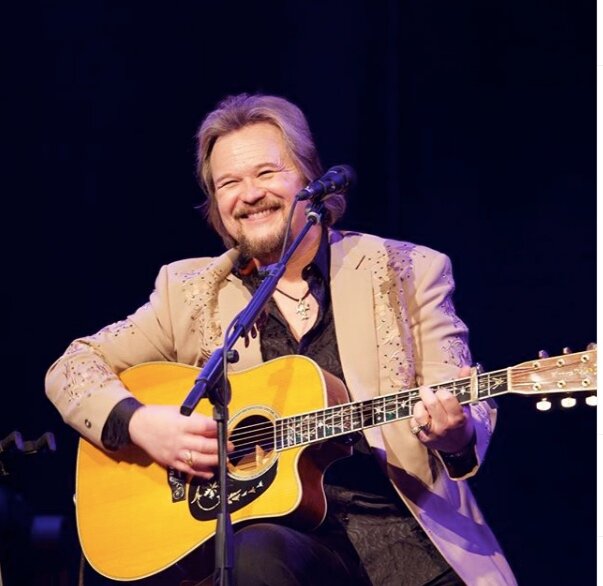Keeping with the unique soul of country music, country-music legend Travis Tritt has never changed his tune.
Written by Constance Dunn
Country music deals in some of the most elemental—and enduring—states of the human condition. It chronicles the joy of love and the pain of loss; feelings of loneliness; having faith; reminiscing about one’s hometown or love of one’s country. Such emotions, experienced by everyone at some point, are the mother tongue of this special brand of music that kicked off its commercial start in the early 20th-century and has continued to garner new fans over the decades, particularly the last couple, when an increasing number of new listeners have been lured by the pop-friendly sounds of modern country.
“Country music has always been, in my mind, the most relatable music for people,” says modern-country pioneer Travis Tritt, a member of the Grand Ole Opry who counts two Grammy awards and four CMAs among his honors. “No matter what your background is. No matter whether you live in a big city or a small town. What your social status is. Country music tends to tell stories about real life.” The thing “that makes country music the soundtrack of the everyday,” he points out, is the “ordinary person.”
When Tritt entered the national music scene in 1989 with his album Country Club, he presented his own style of “outlaw” country, incorporating blues, gospel, Southern rock and more—influences bred in him while growing up in blue-collar Georgia. But it’s a natural thing for a country artist to drink from many sources, given the genre’s a musical catch-all of sorts, uniquely American, with gospel hymns, folk ballads, jazz and blues woven into its densely layered history. It’s also a genre where authenticity is a necessity for success, and its fans have a keen nose for fakes. With a career spanning over 30 years, Tritt has always stayed faithful to his musical instincts, no matter the pressure to produce more hit-friendly fare, notably the trend toward a pop-country sound. “What I’m starting to see personally is that because things have gone so far in that direction over the past 15 years or so, there is currently more of a deep desire for the more traditional sounds in country music,” notes Tritt. “More of the era that I came out of, in the early 90s. That music seems to be having a tremendous resurgence right now, and that’s very exciting for me.”
Helping Tritt stay faithful to his musical vision have been some giants in the business. “I got a lot of encouragement from people that had huge careers before me that basically did the same thing—that refused to do their music any other way other than the way they wanted to do it,” he says. “Among those people probably the most encouragement that I got was from Charlie Daniels and Waylon Jennings, and even Johnny Cash.”
“There’s an old expression: Dance with the one that brought you. I believe in that 100 percent.”
Another icon known for sticking to his guns might have helped, too. “My dad had an old, 63’ Bonneville Pontiac,” recalls Tritt. When the family took young Travis, around 3 years of age at the time, to the drive-in movie theater, the car’s back-seat armrest was folded down, becoming the perfect perch for young Travis to soak up his screen hero. “I remember watching John Wayne movies sitting on that seat and being enthralled,” he says. “As I got older, everything about his persona was so relatable to me. It was Americana at its best. It made me realize: that’s the kind of guy I want to be.”
The relationship between country artists and their fans is a unique one, as well. The artist looks back at his fans and says, “I remember where I came from.” And the fans say: “You’re still one of us.” For Tritt, who grew up singing in the church and later, working in retail and air conditioning, the lessons of faith and hard work—two leitmotifs of country music—find themselves in the lyrics of his songs and have stayed with him personally. “Coming from a hardworking background,” he says, “everybody that I associated with my whole childhood, all the way up through my 20s, all those people, they weren’t people in the entertainment industry. They were people that got up early every morning and went and worked hard.” Early on, church helped form him as a performer and more. “It established not only my love for singing and playing, but it also reinforced my relationship to my community, my family,” says Tritt. “I came from a very blue-collar, common background and I’ve been able to recall all of those experiences, and have all those experiences. It really shaped my music in a deeper way than I can probably express.”
Like other country greats, don’t count on Travis Tritt to go changing. Reliability and staying true to one’s roots are also staples of this genre. “I’m very steeped in a long tradition of straightforward country music,” he says. Plus: “There’s an old expression: Dance with the one that brought you. I believe in that 100 percent.”
Photo (top) courtesy of Travis Tritt




